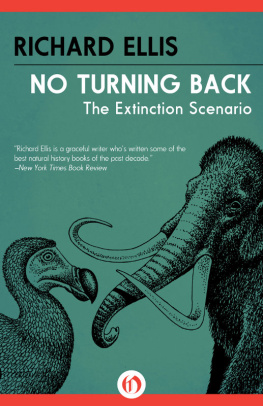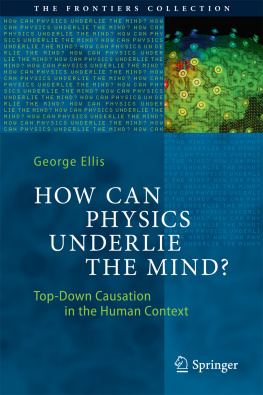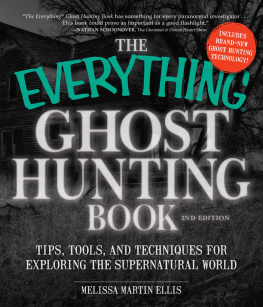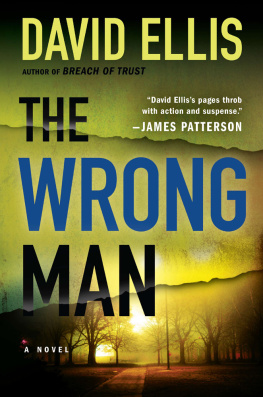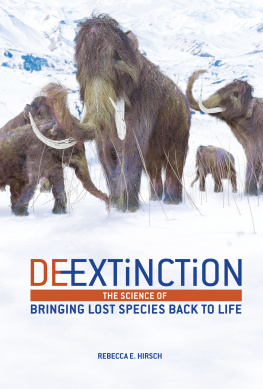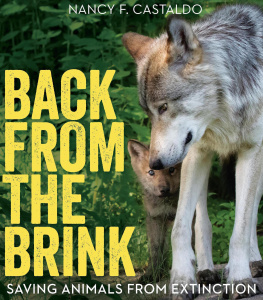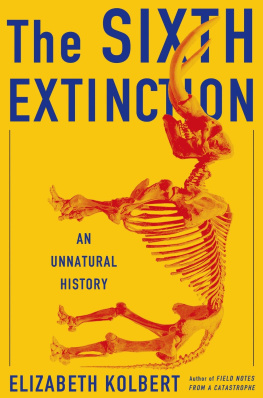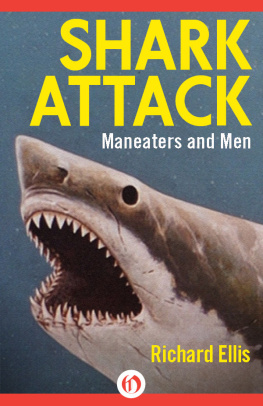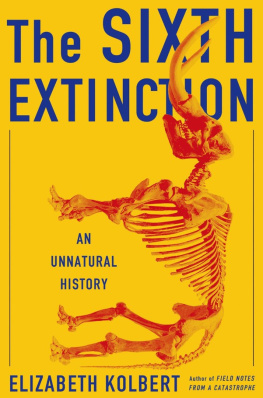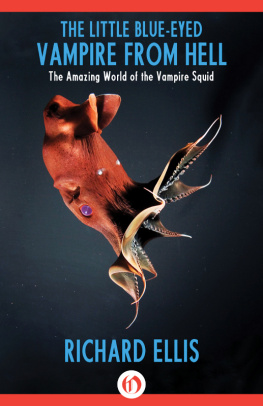
No
Turning
Back
The Extinction Scenario
Written and Illustrated By
Richard Ellis

To-morrow and to-morrow and to-morrow Creeps in this petty pace from day to day,
To the last syllable of recorded time;
And all our yesterdays have lighted fools
The way to dusty death. Out, out, brief candle!
Lifes but a walking shadow, a poor player
That struts and frets his hour upon the stage,
And then is heard no more; it is a tale
Told by an idiot, full of sound and fury,
Signifying nothing.
If youre booked for extinction, theres nothing much you can do about it.
Will Cuppy
How to Become Extinct, 1941
Let us divide up extinction into more manageable pieces. First, there are the great extinctions caused by climatic shifts. Its simply too hot or too cold for something to survive. This kind of extinction we can understand, since the change of climate attacks food supplies and all aspects of habitat at the same time.
Then there are the extinctions caused by huntingthe dodo and the solitaire supposedly come into this category.
Then come the other kinds of extinction, which are altogether more mysterious. Some species are too rigidly specialized. Their lack of adaptability to even small changes, changes so minute that they do not register as such to us, causes them to die out.
As humans we rightly value the ability to adapt to new surroundings. Those who dont, we cheerfully label dinosaurs. Companies that cant adapt deserve to go bust.
And dont we feel, deep down, that those species that have become extinct somehow deserved it too, that their very inability to survive was a moral black mark against them? By a curious alogic, not surviving means you didnt deserve to survive in the first place.
Robert Twigger,
The Extinction Club, 2001
Preface
I THINK I HAVE been writing one book all my adult life. Well, maybe two. The one book, largely about life on earth, the other was about Atlantis. The one book, largely about life in the sea, which I began almost thirty years ago, was conveniently chopped into book-sized pieces by various editors. I began with sharks, moved on to whales and dolphins, then on to whaling history, followed by the great white shark, sea monsters, creatures of the depths, the giant squid, and the origin and evolution of life in the sea. I then chronicled the modern-day depletion of the oceans resourcesthe disappearance of many of the creatures I had written about earlier. I recently took a paleontological detour to investigate the lives of the long-extinct marine reptilesthe ichthyosaurs, plesiosaurs, and mosasaurs, and this excursion into the past inevitably brought up the topic of extinction, the subject of this book.
As told in The Empty Ocean, extinction is no stranger to the sea. In historical times, some of the most noteworthy species losses have taken place in the water; more important, there are others to come. Stellers sea cow, discovered in 1741 by Vitus Berings shipwrecked crew on the island that would later bear his name, was hunted into extinction a mere 28 years later. There are no more great auks, Labrador ducks, or Caribbean monk seals, all eliminated in the past two centuries. Overfishing has driven many species to the brink, and our childrens children may never see a barndoor stake, a northern right whale, or a broadbill swordfish. An important study, published in 2003 by Ransom Myers and Boris Worm just as The Empty Ocean was coming off the presses, noted that industrialized fishing has reduced the numbers of all large predatory fishestuna, swordfish, marlins, groupers, codfish, sharks, skates and raysby 90 percent. Failure to apply the brakes to longlining and gillnetting, the most destructive fishing methods ever devised, will surely result in mass marine extinctions in the near future.
As tempting as it is for conservationists like me to couple overfishing with extinction, the latter process has been part of the history of life on earth since the first cells subdivided billions of years ago, long before Homo destructivus made his appearance on stage. Even though manyprobably mostof the pieces of the puzzle are missing, almost everyone acknowledges the long, complex process of evolution, where early species gave rise to later ones, and so ad infinitum. But what happened to all those earlier species? They went extinct, of course, and H. sapiens had absolutely nothing to do with it, since weve been around only for about 100,000 years.
Many of the earlier extinctions were caused by forces that exceed anything that humans could devise, and in some cases, may even exceed their powers of comprehension. Try to imagine volcanic eruptions lasting for a million years (while youre at it, try to imagine a million years), releasing forces that destroy 90 percent of all life on earth. The great Permian extinction, which occurred 250 million years ago, was so catastrophic that life was almost brought to a close. A hundred and eighty-five million years later, at the close of the Cretaceous, an asteroid the size of Mt. Everest slammed into the Earth at 60,000 miles an hour, and created such environmental havoc that the oceans boiled, skies darkened, acid rain fell for years, and tsunamis half a mile high drowned everything in their path. The Chicxulub impact, named for the Mexican village where the impact crater was discovered, took out various protozoans and algae, the ammonites, the pterosaurs, the pterosaurs, the mosasaurs, and the last of the nonavian dinosaurs, including Tyrannosaurus rex, the most formidable land predator that ever lived.
One might expect that such an enormous cataclysm would destroy virtually every living thing, but many creatures somehow survived the impact and the chaos that followed, including ancestral birds, early mammals, and ancestral crocodiles and turtles. The Age of Reptiles ended with a big bang 65 million years ago, but some reptile lineages made it through, and the warm-blooded vertebrates began the journey that would bring one of them (us) to a position of such global dominance that we can now contemplate our awesome power to generate destruction and modifications that rival the magnitude of the end-Cretaceous extraterrestrial impact.
The sheltering sea offers no protection from the relentless power of extinction. Indeed, while life is believed to have originated in primitive oceans, most of the early life forms are long gone, including trilobites, ammonites, jawless fishes, and weird sharks and fishes that left no descendantseven the amphibians that are believed to have taken the first hesitant steps out of the water, which eventually led to the terrestrial vertebrates (like you): gone, long gone. At one time, gigantic marine reptiles dominated the worlds oceans: 65-foot-long ichthyosaurs chased down their Jurassic prey; four-flippered, long-necked elasmosaurs somehow caught small fishes and cephalopods; and gigantic mosasaurs, with teeth larger than those of T. rex, terrified anything and everything that swam within range. Gone.
Eventually, the sea was conquered by starfishes, sea cucumbers, cephalopods, sharks, fishes, and whales, but the ones we see today are not the same as their ancestors. There were sharks that looked as if they had antlers, others that had teeth on top of their heads, still others that had a whorl of teeth like the blade of a circular saw. The giant Megalodon,
Next page
